Call variants in UGENE can be done using SAMtools mpileup and bcftools view utilities. To read additional information about SAMtools and its utilities visit SAMTools homepage. Both utilities are embedded into UGENE and there is no need in additional configuration.
How to Use This Sample
If you haven't used the workflow samples in UGENE before, look at the "How to Use Sample Workflows" section of the documentation.
Workflow Sample Location
The workflow sample "Call Variants with SAMtools" can be found in the "NGS" section of the Workflow Designer samples.
Workflow Image
The workflow looks as follows:
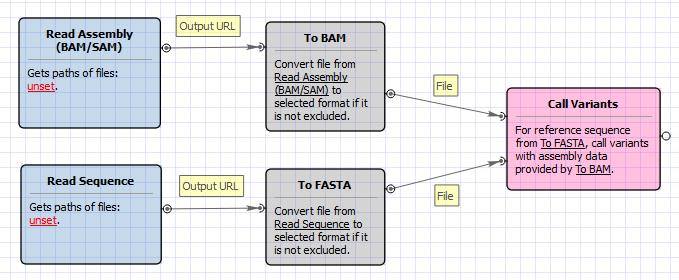
Workflow Wizard
The wizard has 5 pages.
Input reference sequence and assembly: Here you need to input a file with a reference sequence and a sorted BAM or SAM file. Note that the input BAM or SAM file may be unsorted.
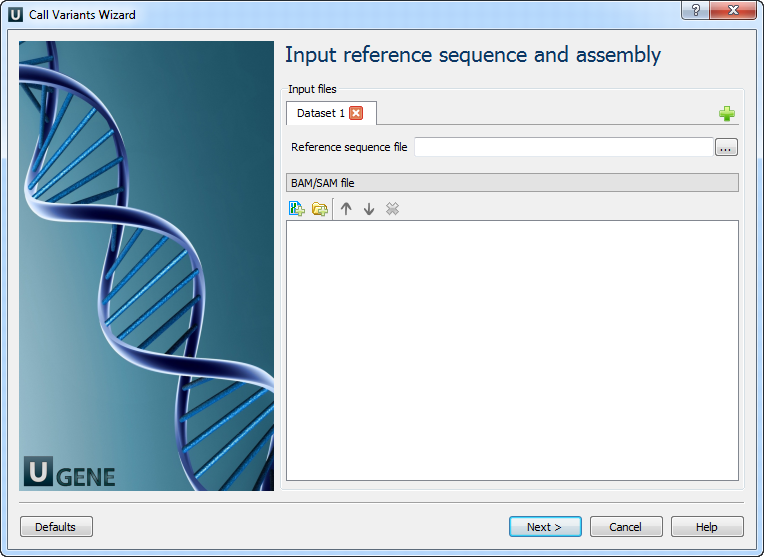
SAMTolls mpileup parameters: Here you can change default parameters of the SAMtools mpileup utility. To show additional parameters click the + button.
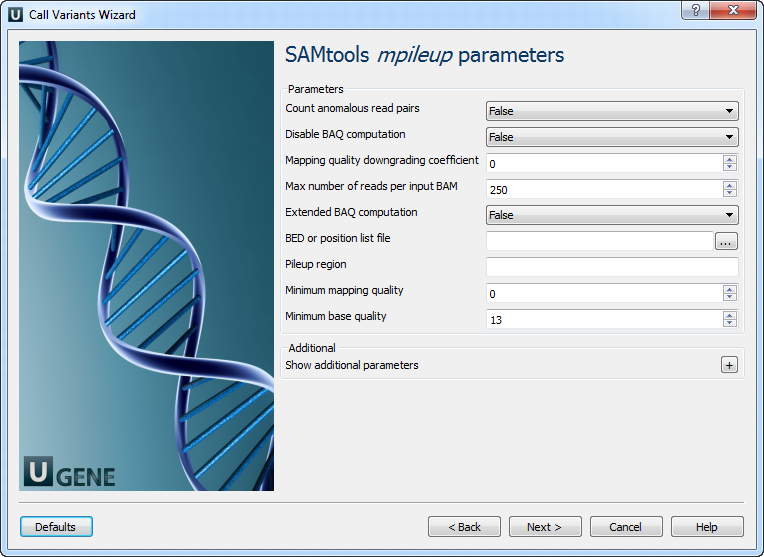
The following parameters are available:
Count anomalous read pairs
Do not skip anomalous read pairs in variant calling.
Disable BAQ computation
Disable probabilistic realignment for the computation of base alignment quality (BAQ). BAQ is the Phred-scaled probability of a read base being misaligned. Applying this option greatly helps to reduce false SNPs caused by misalignments.
Mapping quality downgroading coefficient
Coefficient for downgrading mapping quality for reads containing excessive mismatches. Given a read with a phred-scaled probability q of being generated from the mapped position, the new mapping quality is about sqrt((INT-q)/INT)*INT. A zero value disables this functionality; if enabled, the recommended value for BWA is 50.
Max number of reads per input BAM
At a position, read maximally INT reads per input BAM.
Extended BAQ computation
Extended BAQ computation. This option helps sensitivity especially for MNPs, but may hurt specificity a little bit.
BED or position list file
BED or position list file containing a list of regions or sites where pileup or BCF should be generated.
Pileup region
Only generate pileup in region STR.
Minimum mapping quality
Minimum mapping quality for an alignment to be used.
Minimum base quality
Minimum base quality for a base to be considered.
Illumina-1.3+encoding
Assume the quality is in the Illumina 1.3+ encoding.
Gap extension error
Phred-scaled gap extension sequencing error probability. Reducing INT leads to longer indels.
Homopolymer errors coefficient
Coefficient for modeling homopolymer errors. Given an l-long homopolymer run, the sequencing error of an indel of size s is modeled as INT*s/l.
No INDELs
Do not perform INDEL calling.
Max INDEL depth
Skip INDEL calling if the average per-sample depth is above INT.
Gap open error
Phred-scaled gap open sequencing error probability. Reducing INT leads to more indel calls.
List of platforms for indels
Comma dilimited list of platforms (determined by @RG-PL) from which indel candidates are obtained. It is recommended to collect indel candidates from sequencing technologies that have low indel error rate such as ILLUMINA.
SAMTolls bcftools view parameters: The next page allows one to configure SAMtools bcftools view utility parameters.
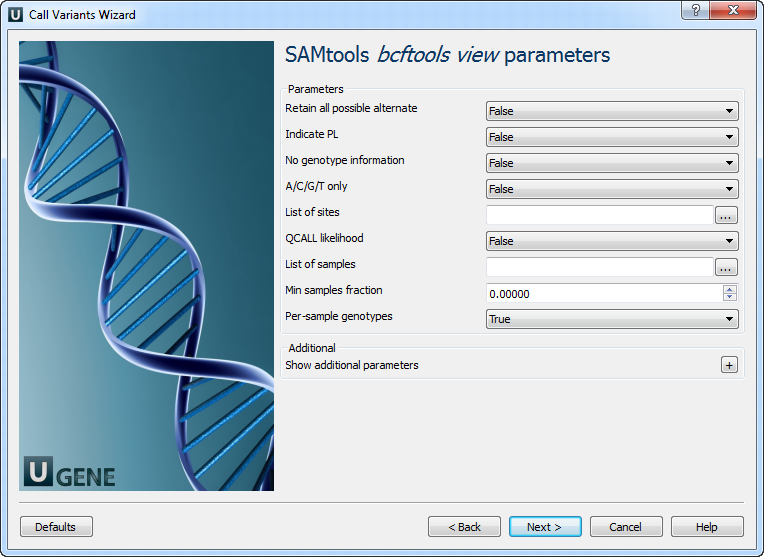
The following parameters are available:
Retain all possible alternative
Retain all possible alternate alleles at variant sites. By default, the view command discards unlikely alleles.
Indicate PL
Indicate PL is generated by r921 or before (ordering is different).
No genotype information
Suppress all individual genotype information.
A/C/G/T only
Skip sites where the REF field is not A/C/G/T.
List of sites
List of sites at which information are outputted.
QCALL likelihood
Output the QCALL likelihood format.
List of samples
List of samples to use. The first column in the input gives the sample names and the second gives the ploidy, which can only be 1 or 2. When the 2nd column is absent, the sample ploidy is assumed to be 2. In the output, the ordering of samples will be identical to the one in FILE.
Min samples fraction
Skip loci where the fraction of samples covered by reads is below FLOAT.
Per-sample genotypes
Call per-sample genotypes at variant sites.
INDEL-to-SNP Ratio
Ratio of INDEL-to-SNP mutation rate.
Gap open error
Phred-scaled gap open sequencing error probability. Reducing INT leads to more indel calls.
Max P(ref|D)
A site is considered to be a variant if P(ref|D).
Pair/trio calling
Enable pair/trio calling. For trio calling, option -s is usually needed to be applied to configure the trio members and their ordering. In the file supplied to the option -s, the first sample must be the child, the second the father and the third the mother. The valid values of STR are “pair”, “trioauto”, “trioxd” and “trioxs”, where “pair” calls differences between two input samples, and “trioxd” (“trioxs”) specifies that the input is from the X chromosome non-PAR regions and the child is a female (male).
N group-1 samples
Number of group-1 samples. This option is used for dividing the samples into two groups for contrast SNP calling or association test. When this option is in use, the following VCF INFO will be outputted: PC2, PCHI2 and QCHI2.
N permutations
Number of permutations for association test (effective only with -1).
Max P(chi^2)
Only perform permutations for P(chi^2).
SAMTolls vcfutils varFilter parameters: The next page allows one to configure SAMtools vcfutils parameters.
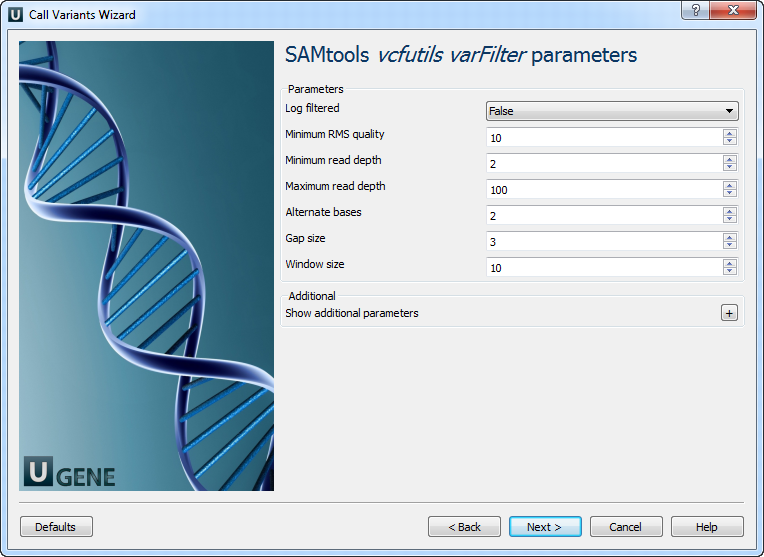
The following parameters are available:
Log filtered
Print filtered variants into the log (varFilter) (-p).
Minimum RMS quality
Minimum RMS mapping quality for SNPs (varFilter) (-Q).
Minimum read depth
Minimum read depth (varFilter) (-d).
Maximum read depth
Maximum read depth (varFilter) (-D).
Alternate bases
Minimum number of alternate bases (varFilter) (-a).
Gap size
SNP within INT bp around a gap to be filtered (varFilter) (-w).
Window size
Window size for filtering adjacent gaps (varFilter) (-W).
Strand bias
Minimum P-value for strand bias (given PV4) (varFilter) (-1).
BaseQ bias
Minimum P-value for baseQ bias (varFilter) (-2).
MapQ bias
Minimum P-value for mapQ bias (varFilter) (-3).
End distance bias
Minimum P-value for end distance bias (varFilter) (-4).
HWE
Minimum P-value for HWE (plus F<0) (varFilter) (-e).
Output variations: On this page you can modify output parameters.
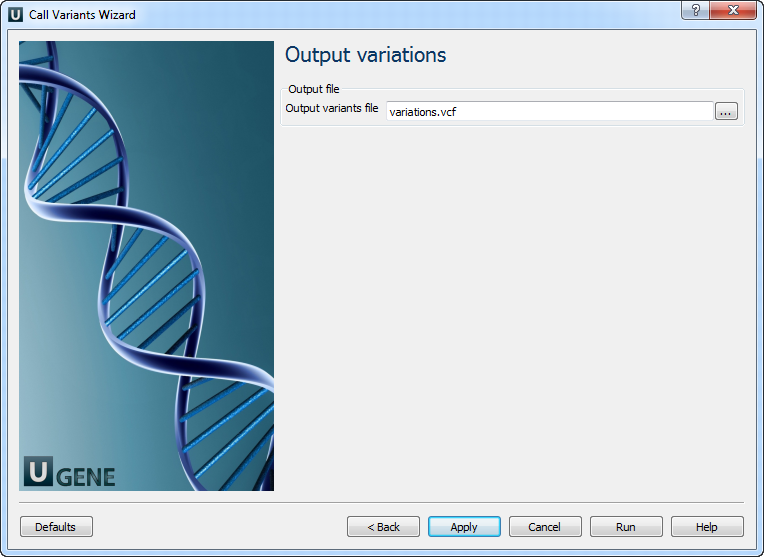
The work on this pipeline was supported by grant RUB1-31097-NO-12 from NIAID.